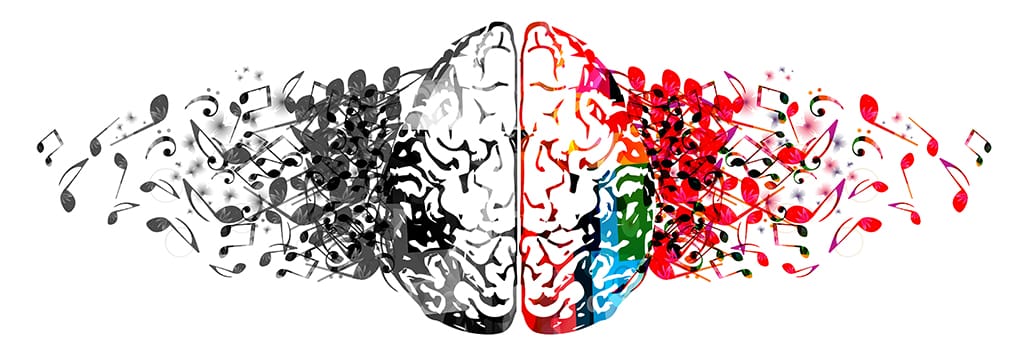Anarchist Harmonies: Music Therapy as A Tool For Trauma and Collective Liberation
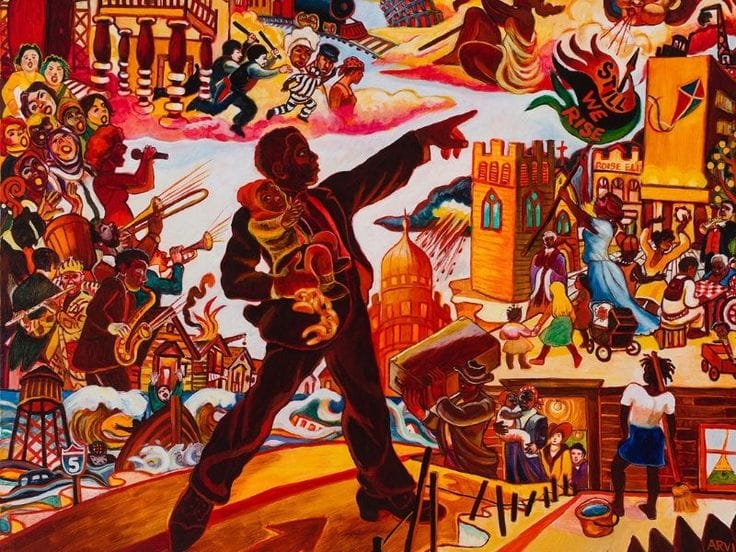
Summary:
An interview with Dorian Wallace. Dorian focuses on carceral settings (prisons, juvenile detention centers), using music to break through toxic masculinity and emotional suppression. He emphasizes meeting people where they’re at, whether through drill music, Quranic chants, or gangster rap, rather than imposing "highbrow" analysis. His approach avoids top-down solutions, instead fostering authentic expression and community-building informed by liberation psychology practices.
Bio:
Dorian Wallace is a composer, pianist, and board-certified music therapist committed to harnessing music's healing qualities for therapeutic work, social justice, and community engagement. His music integrates contemporary classical composition, reflexive improvisation, and therapeutic practices with a focus on addressing systemic inequalities and fostering resilience. His music is deeply rooted in creating emotionally resonant and socially meaningful experiences.
You can find Dorian’s writings at: http://www.dorianwallace.com/
______________________________________________________
Jeff Jones (Liberation Psychotherapy): Thank you Dorian for your participation in this interview. The reason I wanted to interview a music therapist was that in the '80s, I had found myself in the punk rock community. It allowed me to embrace my anger towards abuse and injustice, but in a very positive way. So when I think of healing it always brings me back to music. So allow me to ask you then if you could explain a little bit of who you are and how you became a music therapist?
Dorian: Growing up my parents weren’t abusive but there was this undercurrent of God will figure it out. Even though they would never say that phrase, it was the same psychology. We went to church four times a week. So it's very much we went to church because we were supposed to go to church. I remember when I first cracked from my religious upbringing was when I asked somebody what Catholicism is. She was like it doesn't really matter. They're not Christian. I was around 12 when I first realized “difference” and how we put people into categories. I hung out with a lot of rough kids, more white trash type folks. Growing up we were on the lower end of the middle class spectrum. I came to believe that's where really racialized differences are important to explore. Because even at the bottom of the white experience in the United States, there are people that have it much worse.
I went into the next phase of life being with just the community I grew up with. The lower working class. Then ended up going to school for music, ended up dropping out of school for music, and joined the military. Once in the military, and I joke, I went in as a Republican and left as a socialist. So I was a pianist for the military. Part of the experience was seeing the impacts of the military industrial complex on people's families, on people's lives, and seeing the trauma, how it really manifests in people. It was the first crack in that right wing narrative that I was stuck with. I began to realize I don't agree with any of this (rightwing narrative). Like this is all heinous. I fell into the libertarian trap because they were anti war, anti war on drugs, which I completely agreed with. Eventually I realized over time that the libertarians were very white nationalists and nuts in a lot of bad ways.
The libertarians definitely were an important part of my journey being like, “oh they're conservatives but they're against war”. Anyways, that eventually led me to anarchism. I also got involved with the democratic socialist organizing in New York, with DSA folks. I also joined the IWW. I started to get connected with a lot of different socialist movements. At my roots I'm an anarchist, probably an anarcho communist or a libertarian socialist. However, I have really taken the time to study all the many forms of socialism. Right now I'm in a big Trotskyist era learning phase. I went through a big Marxist-Leninist era study as well. I very much align with the Zapatista movement. Yet there are worthwhile beneficial things to study in Marxist-Leninist movements as they are revolutionary movements that have worked and succeeded. For me the biggest takeaway I learned is that it is very classist to be adamantly against Marxist Leninism. Meaning that, in settler colonial states, Marxist-Leninism has been one of the core ideologies to get indigenous people together to strategically organize and fight. That being said, I do not trust Marxist-Leninism at all in power.
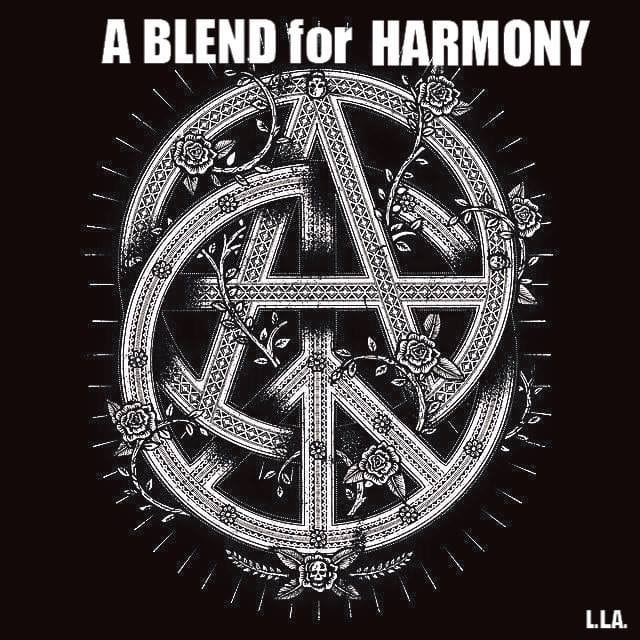
These movements are important to study because prior to those movements Russia was a third world country monarchy. China was a dynasty ruined basically from capitalism. Now Russia and China are two of the world's largest powers. That argument I think is worth having between Anarchists and Marxists and Socialist oriented people.
If we are actually working with working class people we have to be able to talk across political tendencies. Many people in the professional class (such as mental health workers) are liberal if not neoliberal minded. This is a frustrating thing to work with because oftentimes they are very committed to the top down CEO model of typical nonprofits. You can be doing good oriented nonprofit work but it is still a capitalist structure. It does not work in the long run. I believe it encourages narcissism and sociopathic behavior.
I've spent a long time trying to figure out the sort of spiritual dynamics that are addressed during practice, existential philosophy, things combined with liberatory communal expression.
I ended up going to school for music therapy and that's my day job. That's what I do in the daytime. I've really focused on working in the carceral settings. I worked at Rikers island for a period of time. I was at Crossroads Juvenile Detention center, which I actually found more challenging to work at than at Rikers for complicated reasons.
I center all of my work on black liberation at its root. I probably am an anarchist at heart, but my ideological commitment really has come into black liberation from the perspective of being a white cisgender male. I very much subscribe to the Black Panthers and Fred Hampton's Rainbow Coalition model. I really wanted to commit to actually being in black spaces, black majority spaces, but not imposing my whiteness. Being a white person in the space for dialogue about issues. As well as use my white privilege as a shield for various things. The big thing that I have taken away working in the prison system specifically, the majority of the people you work with are working class black people. The people that are locked up are mainly from extreme poverty and the majority of the people you work with are working class people.
So anyways, who am I right now? I consider myself a human being and a composer music therapist as my medium of practice.
Jeff Jones (Liberation Psychotherapy): Most folks who struggle with toxic masculinity or (the effects from) white supremacy would never admit to these struggles. How do you bring it up with music?
Dorian: One thing I've found is that music, especially within the incarcerated setting, is very impactful for breaking down social barriers. Specifically, in cases where we're dealing with toxic masculinity.What do all terrorists, mass shooters, gang bangers, hate group members, domestic abusers, what do they all tend to have in common? They're all men. Male, presenting between the ages of 16 and 26. That's the one thing that is common across all those groups. When we talk liberation psychology, we talk about how we have to center the most marginalized. I make sure to center black women as the core of where everything builds from. In music therapy, at least in prison settings, we're working with a lot of toxic masculinity. People who have trouble expressing suppressed emotions. The analogy I use is a trauma wall. They've built up a wall in front of them that you can't get through. Music is much more fluid than words. It’s like water disintegrating the sand of a wall. Slowly, slowly you break through this wall. Eventually you get to the other side where the actual human being is. Many of the very hard dudes that you meet in prison, especially if you work overnight shifts, you hear so much crying going on. They are not happy being there. They're not happy with any of it. Yet they can't present any of those emotions openly in a group for safety reasons. Music is a way to talk, express, those emotions. We're not going to talk about you, we're going to talk about the lyrics of this song. But they're really talking about themselves. If that makes any sense.
There are people locked up who, if they were not the ethnicity that they are, would be fucking Republicans. Folks that I work with where it's like some of the shit that comes out of their mouth. It's like, man, that is crazy that you just said that. On the other side of it, there are what you might call woke or liberal insiders. It just really hit me one day that our country, the United States, has gotten so racialized that we can't even see class solidarity in certain spaces. We also can't see class conflict in certain spaces. One thing that the white community does very poorly is we look at people of color, specifically black people, we look at them as one monolith. Even when we don't mean to do it. I've caught myself doing it even this last year. I'll give a specific example. When I'm in white or Asian spaces, we'll talk about I'm German, I'm Scottish, I'm Korean, I'm Japanese.
In my mind I knew that was a thing that happened in black communities, but I didn't really understand it until working in black spaces. When you start to hear, I'm Haitian, I'm Jamaican, I'm Guyana, I'm Nigerian. You start to learn what that actually means. I finally got to a point where I started to see everybody differently. I talk to lots of people from a lot of different places and there are so many fucking complications. For instance, how do you address a black trans woman who says something extremely anti-semitic?
I've had somebody say something negative about Jews. Some antiemetic trope about how they own everything. I just let him say what he needed to say, but then talked to him about it. We got into a much deeper conversation about what it really might be is white capitalism that you're experiencing. And by putting that hate out there, by putting that into the universe, you're making it easier to harm others. For others to harm others.
The reason I use this as an example, is that the person in particular was really open to the conversation. It wasn't like we had this big rip apart battle. He was like, oh, yeah, I never thought of it that way. Part of it was because of his own internalized experience on what bigotry is. He's a black man. There's no conspiracies of him, of his people owning the world or owning the media. So in his world that doesn't even sound like bigotry. That sounds like a good thing. Then he was like thank you for talking about this in an open way. However, those conspiracies have gotten other groups harmed in serious ways.
In hate group recovery, the best way to help people get over their hate, their literal hate. That piece is Exposure Therapy. It is meeting people that you disagree with. The amount of times it's like a Nazi starts to question their Nazi beliefs when they have a really good Indian meal. What it does is it makes you start to not dehumanize anymore.You're seeing a whole person suddenly. And now it's like, I'll never let a fascist into one of my spaces, but I will absolutely work with a fascist who is in the process of recovery. There are spaces for that. Sociologically, somebody who's a member of the Crips and somebody who's a member of the American Nazi Party are going to be coming from different spaces. But psychologically, when you are working with a person one on one, you are oftentimes dealing with an angry, disenfranchised male. And they all have issues with women. All of them. As a therapist, I can see all as equals.
I don't bring up white supremacy or toxic masculinity necessarily, because the thing about those types of terms, and they're important for us to know. These terms were created by sociologists. There's a certain amount of nuance that I think organizers have because we are so interested in humanizing people that we sometimes forget to actually humanize them. Like, to look at a person as a person.
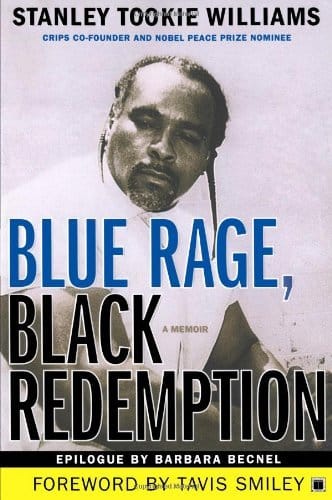
I'll give an example. You know Stanley Tookie Williams, he was the founder of the Crips along with Raymond Washington. Tookie wrote a book before he was unalived. The book is called Blue Rage, Black Redemption. It speaks about his experiences getting started gang banging and how it came about. He talks about his own experience, not about the political end of it. He was like, yeah, all of political/economic oppression was true, but I was also 18. What was I thinking? I wasn't thinking that (in a political) way.
He went on to explain that of course we can look at it now through those lenses. That it was a reaction to such and such oppressive situations. But at the time you're thinking I need money or I want people to think I'm hard. He has this part in the book where, when he was locked up, people would send him sociology and philosophical essays, like Sartre, texts like that. He was like this stuff went way over my head. Like I've never read anything. People thought they were trying to help, but they ended up giving me a book that made me feel that much more stupid than before. They weren't treating me at my education level. They were looking at my adulthood and not realizing I dropped out when I was 14. Oftentimes, the education stops because of being incarcerated. Incarcerated doesn't just mean behind bars. It also means probation. It also means parole.
So that really helped me in communicating where sometimes I'll want to talk about all this super high level sociological stuff. I have to remember it's like, yo, I went to college and learned this stuff by reading books. Like that's a lot to impose on somebody who's been in a distressful situation.
Jeff Jones (Liberation Psychotherapy): What you're doing is looking for the cracks as in the metaphor where the flowers come up through the sidewalks?
Dorian: So with music therapy I don't go in and try to teach someone lyric analysis of J. Cole. We're not going to get into like this is the real pop you should be listening to. A lot of people tell me how I need to get the kids into "better music" in air quotes. How about instead we meet the person where they're at. Listen to the music that they choose and find those meanings in that music that they find. As a music therapist professional I may use King Von, Lil Durk, Kay Flock. Even then it's like these names are already starting to become old names..
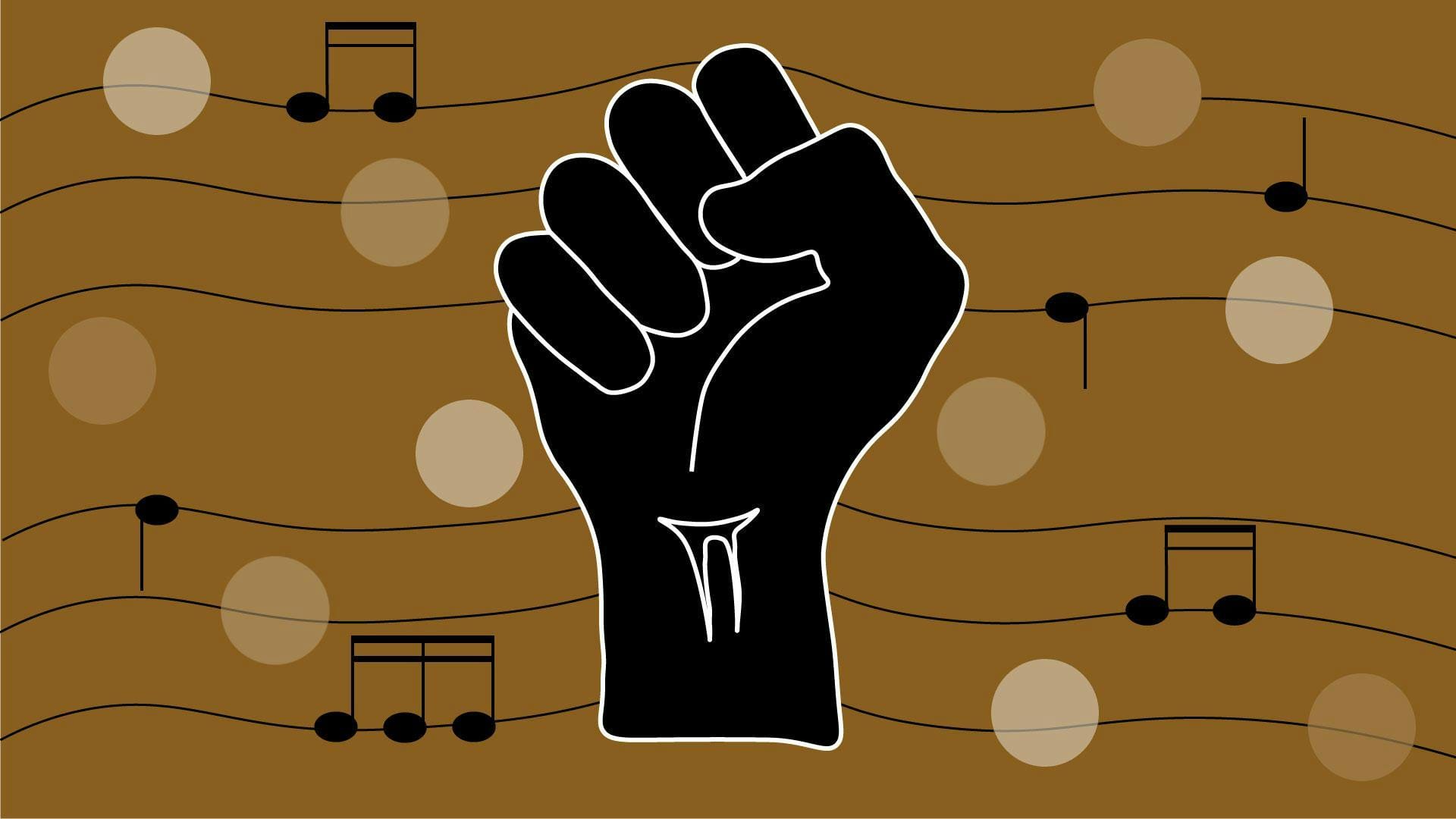
It's going to be a new generation in three years. Part of my job as a music therapist is to be aware of those musical changes and you have to listen to music differently. So one of the big genres of music, especially those who are locked up listening to, it's called drill music. It's not lyrically in depth. They say something and it's through auto-tune and that's it. Older people will have issues that the production sounds not very good or like that the lyrical craft is not really sophisticated. Somebody like Biggie smalls has like 15 analogies going on at once. This is a natural flow of music over time. Like when we went from hair metal to Nirvana. So I'm not gonna listen to this music as if it's super technical, high production value. I'm gonna listen to it as if it's like how these kids listen to it. It's like they're listening to the literal lyrics, which are oftentimes just telling a very direct story in a very indirect way. It'll make a reference to going on the block and getting on some dance shoes. It's specifically talking about an event that happened between two sets in April.The lyrical content's different and also the rhythm flow is different. They mumble everything and add the auto-tune part. The reason that happens is because a lot of these kids are from poverty where the music started. They're using free things like GarageBand. They were never taught to sing, so they just do auto-tune because it's an easy thing to do. So if you're listening to it as if you’re trying to fix blah, blah, blah. Instead listen to it like these 15 year old kids in poverty who are making music that they want to make. Then it just changes the meaning of the music.
One thing that cracks me up. Even from just generational experiences, a lot of older black folks will complain to me about this new music that they don't even use samples anymore. I remember when samples were not a good thing. Now it's like these kids, they don't use them. I was just like, wow, these things are circular.
Jeff Jones (Liberation Psychotherapy): What I'm hearing is that part of what you're doing with music therapy is that you are not telling anybody what to do or how to do it. It's about allowing for an authentic experience. How does this lead to mental health healing or is this the healing in and of itself?
Dorian: Let me give an example. I’ve had so many employers want me to get inmates or juveniles to stop fighting with each other. It's like you want me to get this group of 16 year old kids on murder charges, involved in gangs, and have no parents because they all are dead. You want me to get them to regulate their emotions and stop fighting when I can't even get my Preschool Parents Group Chat emotions in order? It's such a silly request. I'm not going to be able to convince somebody to change something they don’t want to change. What we're going to do is we're going to talk about their experiences through the musical lyrics about women, experiences with relationships, and power structures. We may use the concept of titration and somatic experiencing.
It's like drop by drop by drop. It's another form of titration. I'll give another really cool example. One of the kids I was working with was in the middle of converting to Islam and was associated with the Bloods. He's in the middle of converting. Those incarcerated don't have access to the Internet. Sometimes they do, but they don't have regular access. So I bring in MP3 players with the music that they want to listen to. Most of the time I bring in all the gangster-like stuff that's literally like, “Here's a real thing I did that I'm actually telling you about that will be used in a trial against me”. It'll be that kind of music. Then once I put on some recordings of the Quran being sung in a traditional way. Really beautiful sounding music. I brought that in and I've got all these kids, who were doing a piano class, and I gave them the MP3s afterwards. They could listen to whatever they wanted to but they wanted the Islamic music. They listened to it for 25 minutes as a group on their own in quiet.
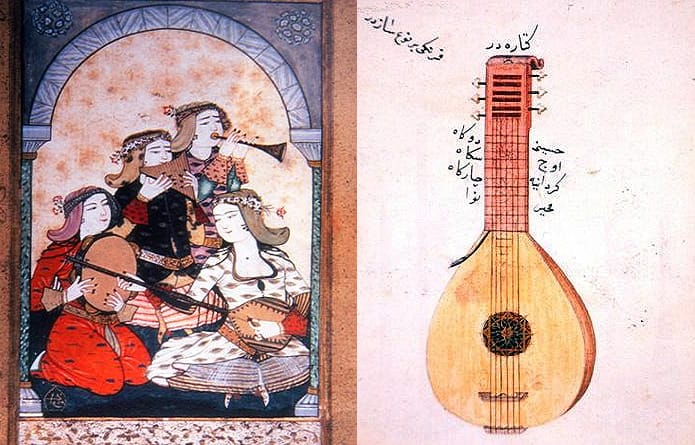
Not all of them are Muslims, but they were just so chill. It was a moment of peace for everybody. There's also something about these folks. They live in this awful environment and just by being given options it feels a little abnormal. I always have mindfulness activities like coloring with me. People instinctively...before any group, I put the color printouts and colored pencils out and I don't mention it again. People just come over, check it out, grab things, and it just helps get people to regulate a little bit more. From my perspective, no amount of trauma exercises such as learning how to do deep breathing is going to make prison better. There are literally people who want to kill you with you in there.That's something a lot of people don't understand about these spaces. You are actually on high alert because there are people that might have a specific issue with you and want to hurt you.
One of the hardest traumas I ever had as a music therapist was when a former participant got killed. Then the newest participant in the group was the person who had un-alived him. It's a complex and weird feeling. Hard to work through just because it's like, it was just another kid and it's not like the first kid wouldn't have tried to do the same thing. They're at war with each other. They're gangs. So I just try to emphasize that it's like no amount of, "all right, let's work on our breathing..." is gonna reduce the stress. My goal isn't to teach.
Jeff Jones (Liberation Psychotherapy): Instead of knowing where we are going I am with you on the journey?
Dorian: Yes, because what is healing is a hard thing to answer. If we look at it through a trauma lens, are we ever completely done with PTSD? I don't think so. Healing is about navigating well, navigating this world in a healthy, holistic way.
I don't care about good intentions. I don't care about what people in our field, what our intentions are. We have to pay attention to what actually helps people. What I think is more important is healing from my perspective is making sure that the communities we're supporting feel seen. What being seen means is that they can say an idea that's absolutely wrong and it's okay to experience that and to have those dialogues. You need to make it as comfortable as possible. From my perspective I'm not going to be able to heal what colonialism has done to the African American community. It's not going to be possible by doing one therapeutic technique and everything's healed. I think it's much more important to build community.
Jeff Jones (Liberation Psychotherapy): Any group or movement you would like to give a shout out to that readers should know about in order to give donations/mutual aid/or solidarity to?
Dorian : Yeah. One project you can get involved in is Sing in Solidarity, the NYC-DSA socialist choir. Reach out if you're interested in singing with us or starting your own socialist choir in your area. No Gods, No Masters, No Auditions! @nycdsachoir on Instagram
I also encourage folks to check out HOLLA, a healing justice movement doing powerful community work. You can support them by donating or connecting to see how you can offer support: healwithholla.com
Anyway, I got to jump. Thanks for the dialogue. Peace, brother.
Check out the latest album by Dorian. Out now, “Laeh Su Tel!”
…”unified by the theme of authentic musical expression as an act of solidarity for the working-classes, underclasses, and Indigenous peoples of the world, a celebration of revolutionary love and collective consciousness. I hope to evangelize the potential of music therapy in addressing trauma-informed care, neurodivergent awareness, and critical social analysis rooted in the fight for liberation and solidarity for all people!”
Find it at: https://doriansmode.substack.com/p/laeh-su-tel-8a7
